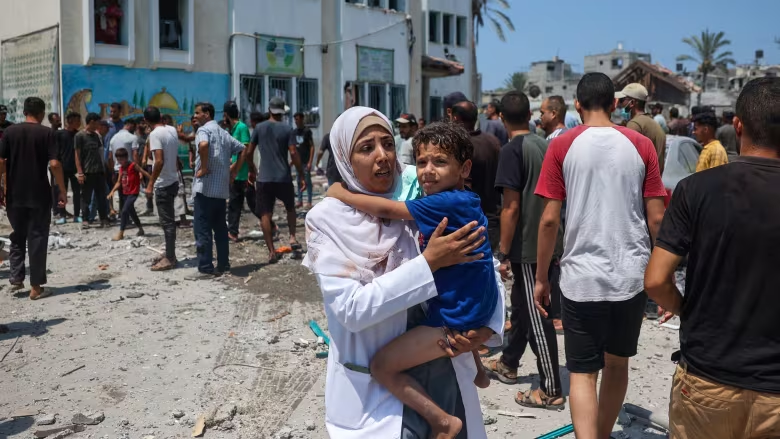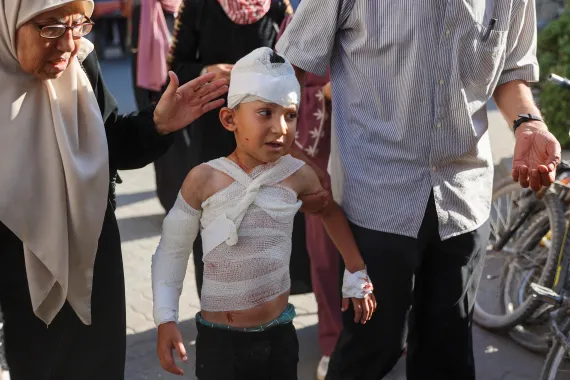Israeli Strikes Kill at Least 30 Palestinians in Gaza Amid Rising Tensions at Kamal Adwan Hospital.
In the early hours of Thursday, Israeli military strikes intensified across Gaza, targeting locations in northern Gaza, including the Kamal Adwan Hospital. Reports from Palestinians health officials indicate that at least 30 Palestinians have been killed in the latest attacks, with many of the strikes focused on the northern region of Gaza, where Israeli military operations have been escalating.
The assault on Gaza has amplified in recent weeks, with Israel claiming to dismantle what it calls a critical Hamas military infrastructure within the densely populated northern region. The Kamal Adwan Hospital, located in Beit Lahiya, has become a focal point of conflict, underscoring the dangers faced by civilians and healthcare workers. Health officials in Gaza reported that the hospital’s third floor was struck, igniting medical supplies, causing considerable disruption to hospital operations, and leading to minor injuries among hospital staff.
The airstrike has raised significant concerns about the safety of medical facilities in Gaza. Health ministry officials in Gaza and international humanitarian groups have condemned the attacks on healthcare sites, emphasizing the need for protections under international humanitarian law. According to Eid Sabbah, director of nursing at Kamal Adwan, the hit disrupted vital hospital functions.

“Medical staff have been injured, supplies have been damaged, and the medical response in Gaza has become even more difficult as we continue to manage overwhelming patient needs with limited resources,” Sabbah shared in a statement to Reuters.
The Israeli military has responded to criticisms, asserting that Hamas is responsible for placing military assets within and around civilian infrastructures, specifically pointing to Kamal Adwan Hospital. Israel alleges that “dozens of terrorists” are using the hospital as a cover, hiding in areas meant for patient care and sheltering there to avoid detection. Israeli forces contend that Hamas is using hospital staff as camouflage, making it challenging for military operations to avoid civilian casualties.
In response, Palestinian health authorities, alongside Hamas, have categorically denied these claims. The health ministry in Gaza has appealed to international bodies, calling for protections for healthcare workers and medical facilities amid the conflict. Médecins Sans Frontières (MSF) joined these calls, highlighting the severe dangers faced by healthcare workers in Gaza and confirming that one of its doctors, Dr. Mohammed Obeid, had been detained by Israeli forces during recent hostilities.
In addition to airstrikes, Israel has expanded its ground presence in northern Gaza. Following a series of earlier incursions, Israeli military units entered Jabalia, Beit Hanoun, and Beit Lahiya with the stated intent of neutralizing Hamas strongholds. The continued presence of Israeli tanks and military units in the area is indicative of the high-stakes conflict unfolding in this densely populated region. Last week, Israeli forces occupied parts of Kamal Adwan Hospital, temporarily detaining approximately 100 suspected Hamas operatives before pulling back. The continued presence of tanks and military units nearby has intensified the risks faced by civilians and medical personnel in the vicinity.

As reports of casualties mount, the health ministry in Gaza has emphasized the urgency of a global response. In a statement issued shortly after the latest hospital incident, the ministry urged international organizations “to protect hospitals and medical staff from the brutality of the Israeli occupation.”
The humanitarian situation in Gaza is deteriorating rapidly, with health facilities across the enclave struggling to provide critical care to an escalating number of wounded Palestinians. The World Health Organization (WHO) and other international organizations have documented the growing threat to healthcare services in Gaza, pointing out that hospitals are at high risk of severe operational breakdowns due to fuel shortages, equipment damage, and staff shortages as the conflict escalates.
The Gaza conflict erupted on October 7, 2023, after an unprecedented attack by Hamas-led militants on Israel. According to Israeli sources, the initial Hamas operation resulted in the deaths of around 1,200 Israeli citizens and the capture of over 250 hostages who were subsequently taken to Gaza. This attack prompted a large-scale Israeli military response, which has escalated into one of the most devastating conflicts in Gaza’s recent history.
Since the onset of the conflict, the Palestinian health ministry has reported that more than 43,000 Palestinians have lost their lives due to Israeli airstrikes and ground operations, and extensive damage has been inflicted on Gaza’s infrastructure. The enclave’s neighborhoods have been reduced to rubble, with many areas left without access to basic amenities, including clean water and power. The destruction of essential infrastructure and health facilities has exacerbated the crisis for Gaza’s 2.3 million residents, who are living amid dwindling resources and mounting casualties.
The UN and various international bodies have appealed for the protection of civilians and humanitarian aid workers in Gaza. The Red Cross, in coordination with Palestinian health authorities, is calling for greater access to hospitals in Gaza, especially for areas like Kamal Adwan Hospital, which has sustained direct hits.
Humanitarian organization Médecins Sans Frontières (MSF) has also raised serious concerns about the safety of medical staff, urging both parties to adhere to the principles of the Geneva Conventions, which provide protections for medical workers and facilities in conflict zones. The recent detention of MSF doctor Mohammed Obeid has prompted calls for the safety and security of all medical staff who are working tirelessly to save lives amid ongoing violence.
The escalation in Gaza has spurred a worldwide call for a ceasefire and an end to the humanitarian disaster unfolding in the enclave. Global leaders, human rights organizations, and numerous UN agencies have expressed concern over the large-scale impact of the conflict on civilians, urging both Israel and Hamas to prioritize the protection of innocent lives.
Amidst the mounting casualties and destroyed infrastructure, Palestinians in Gaza are pleading for international intervention to end the violence and provide immediate humanitarian relief. With many areas now left without the means to access basic healthcare, food, and shelter, residents are facing some of the most severe humanitarian conditions in recent history.
For the time being, however, Israel’s military strategy in northern Gaza remains in full force, with reports suggesting further escalations may follow in the coming days.




